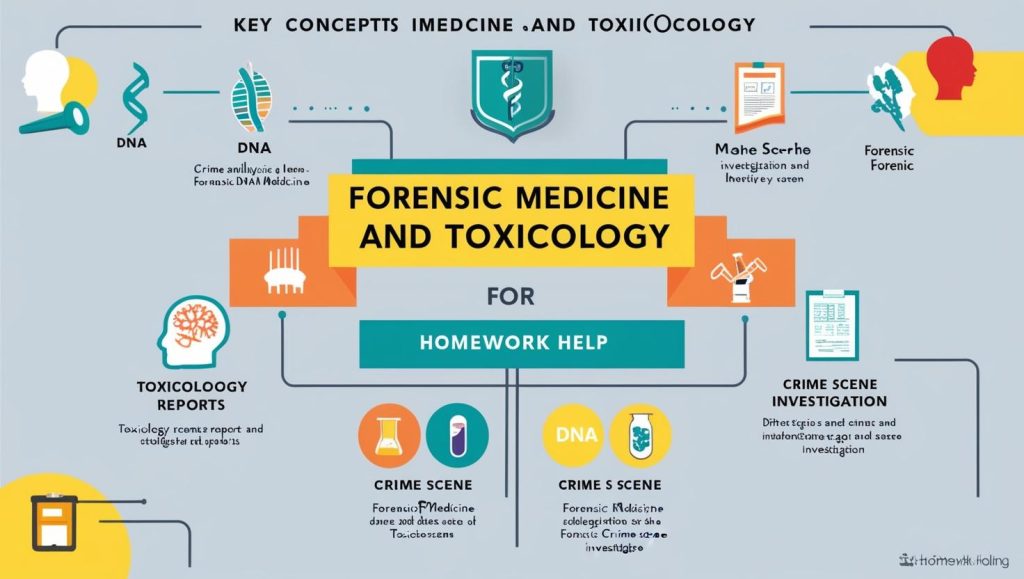Introduction
Forensic Medicine and Toxicology (FMT) is an essential branch of medical science that involves the application of medical knowledge to legal cases. It encompasses post-mortem examinations, cause-of-death analysis, and the study of poisons and their effects on the human body. Due to its complex nature, students often struggle with assignments in this field. This Forensic Medicine and Toxicology Homework Help guide will provide you with in-depth knowledge, useful resources, and effective study strategies to excel in your coursework.

What is Forensic Medicine and Toxicology?
Forensic Medicine and Toxicology integrates two key disciplines:
- Forensic Medicine: The application of medical knowledge in criminal and civil cases, including autopsy procedures, injury assessments, and legal aspects of medical practice.
- Toxicology: The study of toxins, their effects on the human body, and methods of detection.
This field plays a crucial role in solving crimes, determining causes of death, and supporting the legal system with scientific evidence.
Importance of Forensic Medicine and Toxicology in Modern Science
FMT is vital for criminal investigations, legal cases, and public health. Some key applications include:
- Crime Scene Investigation: Helps in collecting and analyzing biological evidence.
- Autopsy and Post-mortem Reports: Determines the cause and manner of death.
- Toxicological Analysis: Detects poisons and drugs in biological samples.
- Medical Jurisprudence: Ensures legal compliance in medical practice.
This Forensic Medicine and Toxicology Homework Help guide aims to simplify these topics and assist students in mastering them effectively.
Challenges Faced by Students in Forensic Medicine and Toxicology
1. Understanding Complex Terminology
FMT involves numerous medical and legal terminologies. Using flashcards or medical dictionaries like Merriam-Webster Medical Dictionary can help in memorization.
2. Interpreting Autopsy Reports
Analyzing autopsy findings requires detailed anatomical knowledge. Websites like National Library of Medicine offer free access to forensic case studies.
3. Toxicology Analysis and Interpretation
Students often struggle with identifying toxins and their effects. Online courses from platforms like Coursera and edX provide valuable learning materials.
4. Applying Legal Aspects in Case Studies
Understanding medical jurisprudence requires knowledge of legal principles. Resources from Harvard Law School can provide insights into forensic law.
Study Tips for Excelling in Forensic Medicine and Toxicology Assignments
1. Utilize Online Resources
Here are some useful websites for learning FMT:
- PubMed – Research articles on forensic medicine.
- Forensic Medicine and Pathology Journal – Case studies and latest research.
- ForensicTox – Guides on forensic toxicology procedures.
2. Understand Poisoning Mechanisms
Toxicology involves studying different types of poisons and their physiological effects. Learn about:
- Cyanide Poisoning: Blocks cellular respiration.
- Carbon Monoxide Poisoning: Prevents oxygen binding to hemoglobin.
- Drug Overdoses: Affects the nervous and cardiovascular systems.
3. Practice with Mock Cases
Analyzing real-life forensic cases enhances problem-solving skills. Medscape provides case studies that help in applying theoretical knowledge.
4. Improve Report Writing Skills
FMT assignments often require detailed reports. Follow these steps for effective report writing:
- Clearly describe observations.
- Provide logical explanations based on medical evidence.
- Cite credible sources for scientific backing.
5. Join Forensic Science Forums and Study Groups
Engaging with fellow students and professionals can help in clarifying doubts. Join platforms like Reddit’s Forensic Science Community for discussions.
Common Topics Covered in Forensic Medicine and Toxicology Homework
- Post-mortem Changes: Rigor mortis, livor mortis, and algor mortis.
- Types of Wounds: Incised, lacerated, and contusions.
- Forensic Odontology: Dental identification of victims.
- Alcohol and Drug Intoxication: Effects on the human body.
- Poisons and Their Antidotes: Common toxic substances and treatments.
Recommended Books for Forensic Medicine and Toxicology Students
For a deeper understanding, consider these textbooks:
- “The Essentials of Forensic Medicine and Toxicology” by K.S. Narayan Reddy.
- “Forensic Pathology” by Vincent J.M. DiMaio.
- “Clark’s Analysis of Drugs and Poisons” by Anthony C. Moffat.
These books provide detailed explanations and case studies essential for mastering FMT.
Conclusion
Forensic Medicine and Toxicology is an exciting yet challenging field that requires a combination of medical and legal knowledge. By utilizing online resources, practicing case studies, and improving report-writing skills, students can enhance their understanding and excel in their assignments. This Forensic Medicine and Toxicology Homework Help guide is designed to simplify complex topics and provide students with the necessary tools to succeed in their coursework.


